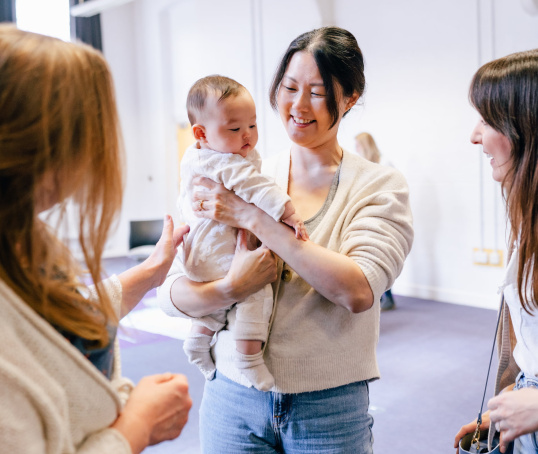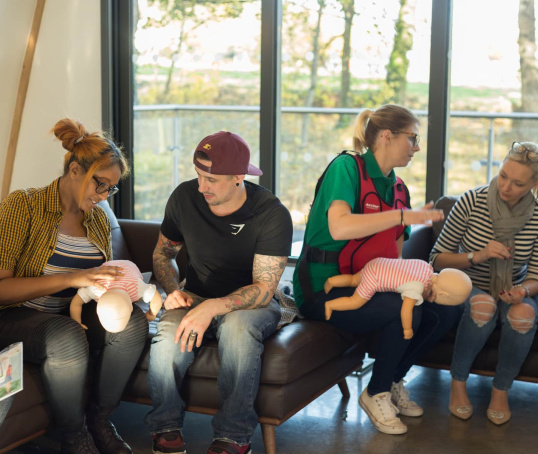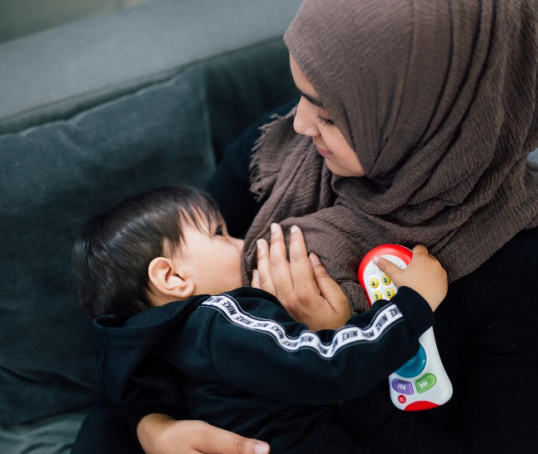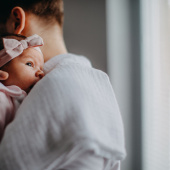Read about what might be making your child seem unwell, how to treat common respiratory and ear infections at home and when to go to the doctor.
Although it can be worrying when a baby or child is ill, it’s normal for them to get coughs and colds. Most of the time, they will get better with rest and care at home. The symptoms below might help identify what’s wrong and when to get medical help.
The information below is for guidance only. If you’re concerned about a baby, make a GP appointment or call NHS 111.
When to get emergency help
Call 999 or go to the Emergency department if a baby or child of any age (NHS, 2023; NHS, 2022; NHS, 2021a):
- goes blue or grey on the lips, tongue, face or skin – on Black or Brown skin this is easier to see on the palms of the hands and soles of the feet
- is finding it hard to breathe, or pauses between breaths
- seems to find breathing or coughing painful
- is floppy, will not wake up or stay awake
- is having seizures (fits)
- can't swallow fluids
Colds
It’s very common for babies and young children to have colds. In fact, they can have as many as eight or more a year. This is because they haven’t had them before (NHS, 2021a).
The good news is that with each cold their immunity increases, and they will get fewer colds (NHS, 2021a).
Each cold can last between five and seven days. Very young children, however, might not get fully better for a couple of weeks (NHS, 2021a).
A cold might cause the baby to have a slightly higher temperature. A high temperature for babies and children is 38°C or more (NHS, 2024a). See our article on childhood fever and when to see the doctor.
Treatment for colds
Most babies and children will get better after being looked after at home.
Get an urgent GP appointment for suspected bronchiolitis if (NHS, 2022):
- the baby's cold is getting worse
- they're eating or feeding less than normal
- they've had a dry nappy for 12 hours or more
- they're very tired or irritable
- they feel unusually hot or sweaty
- a baby under three months has a temperature of 38°C, or is older than three months and has a temperature of 39°C or more
Sore throat
A baby might have a sore throat up to two days before a cold or flu starts (NHS, 2021a).
Sore throats usually get better by themselves. Looking after them at home will help them feel more comfortable. If they’re still feeling unwell after four days, take them to the GP (NHS, 2021a).
If the baby or child can’t swallow fluids or has trouble breathing, ring 999 or go to the Emergency department (NHS, 2021a).
Coughs
When a baby or child has a cold, mucus trickles down the back of the throat. This makes them cough. Coughing helps clear away this mucus, as well as phlegm from the chest (NHS, 2021a).
Hearing a baby coughing is not nice, but most of the time, it will get better on its own. As long as they are feeding, drinking, eating and breathing normally, you should be able to care for them at home until they get better (NHS, 2021a).
The cough might be asthma if it (NHS, 2021a):
- lasts a long time, sometimes several weeks
- is worse at night or after exercise
- they are wheezing
Bronchiolitis (bron-kee-o-ly-tis)
Bronchiolitis affects babies up to two years old. It is caused by a virus, often RSV (respiratory syncytial virus). This is a common virus spread by coughing and sneezing (NHS, 2022).
Bronchiolitis is different from bronchitis (bron-ky-tis ), which can affect people of all ages.
Although it is usually mild, some babies are at a higher risk of getting seriously ill. This includes those (NHS, 2022):
- under six months old
- born prematurely
- with a weakened immune system
- with a heart or lung condition
Early symptoms are like a cold. For example, sneezing, a runny or blocked nose, a cough or slightly raised temperature (38°C) (NHS, 2022).
But then other symptoms might appear, including (NHS, 2022):
- noisy breathing, or breathing more quickly
- difficulty feeding or eating
- irritability
Usually, the baby can be looked after at home with no additional treatment. If the baby is at higher risk, or you are concerned, make an appointment with the GP or get medical help. The worst symptoms might last for five days, and the cough is usually better in three weeks (NHS, 2022).
NHS has more information about RSV.
Whooping cough (pertussis)
Whooping cough or pertussis starts with similar symptoms to a cold, including a sore throat and runny nose. There isn’t usually a high temperature (NHS, 2023).
After seven days or so, coughing bouts start and are worse at night. The baby or child might make a ‘whooping’ sound between coughs, but this is less common in young babies. They may have difficulty breathing and turn blue or grey. They might bring up thick mucus (NHS, 2023).
Babies under 12 months old with whooping cough may be at risk of (NHS, 2023):
- difficulty breathing
- dehydration
- seizures (fits)
- pneumonia (new-MO-nee-uh )
Get an urgent GP appointment or call 111 if a baby is under six months and is showing signs of whooping cough (NHS, 2023).
How is whooping cough treated?
Older babies will recover with usual care at home. If the baby is under six months old, they may need to go to hospital (NHS, 2023).
Whooping cough might be treated with antibiotics if diagnosed within two weeks. This is to prevent it spreading to others (NHS, 2023).
Pregnant women and people can get vaccinated against whooping cough between 16 and 32 weeks of pregnancy. This helps protect their baby after it is born. At eight weeks old, babies can be given the six-in-one vaccine which provides protection against whooping cough.
How long does whooping cough last?
Whooping cough is contagious for up to 3 weeks after the coughing starts. The cough may last for several weeks or even months (NHS, 2023).
Find out more about the treatment for whooping cough on this NHS page.
Croup
Croup symptoms are similar to a normal cough or cold, with a runny nose, sore throat, and high temperature. In addition, there is a barking cough and a harsh sound when breathing in (NHS, 2021a).
Croup usually gets better with rest at home but get urgent medical help if it is severe or the baby is having difficulty breathing (NHS, 2021a).
Ear infection
Middle ear infections are common in babies and children and usually get better on their own in a few days (NHS, 2021b).
A baby might show signs of an ear infection such as (NHS, 2021b):
- pulling at their ear
- not reacting to some sounds
- irritable or restless
- losing their balance
- not interested in food
Symptoms start quickly and can also include (NHS, 2021b):
- a high temperature
- lack of energy
- scaly skin in and around the ear
A baby can be helped to feel better with rest at home. Most symptoms will resolve within a week. Don’t put anything inside the ear, including oil or cotton buds. You can put a warm or cold flannel on the ear if it seems to help (NHS, 2021b).
The GP can help if (NHS, 2021a):
- the ear infection doesn’t get better within a few days
- the baby regularly gets ear infections.
Call 111 for advice if (NHS, 2021a):
- there is fluid coming out of the ear
- the baby is sick
- the baby is under two and there seems to be an infection in both ears
How to care for a baby at home
Medication
Babies can be given children’s paracetamol from two months old or children’s ibuprofen from three months old. This helps ease the pain and makes them feel more comfortable.
Always give the correct dose, and don’t alternate paracetamol and ibuprofen unless a doctor has told you to (NHS, 2024b).
Saline drops can help relieve a blocked nose by loosening the mucus so it comes out more easily (NHS, 2021a). Your pharmacist can advise on how to use them.
Fluids
Offer plenty of their usual drinks so they remain hydrated. Under a year this is breastmilk, formula milk or water. Don’t worry about solid food until they’re interested in it (NHS, 2024c).
Babies over a year old can have honey and lemon in boiled then slightly cooled water to drink for a sore throat or cough (NHS, 2021a). See the NHS website for how to make it.
Rest
Let them get plenty of rest. This doesn’t have to be in bed, but wherever they are comfortable. Listening to stories may help them fall asleep (NHS, 2024c).
Caring for a sick child can be exhausting. It’s important for the parent or caregiver to rest when possible and accept offers of help (NHS, 2024c).
Who might be able to offer advice on what to do? (NHS, 2024c)
The pharmacist may be easier to get hold of quickly for advice on medication or whether you need to see a GP. The health visitor or practice nurse may also be a useful first person to see.
If you’re not able to see a GP, calling 111 can get you an out of hours or emergency appointment, 24 hours a day if needed.
If you’re very worried, call 999 or go to the Emergency department.
Is it possible to prevent common infections?
It’s almost impossible to avoid common infections, but there are ways to minimize them.
- Having the RSV and whooping cough vaccinations from 28 weeks of pregnancy can protect the baby for the first few months after they’re born (NHS, 2022; NHS, 2023).
- Encouraging everyone in the family to wash their hands regularly can stop the spread of germs (NHS, 2021a).
- Clean toys and surfaces, and throw away disposable tissues immediately (NHS, 2022).
- Avoid anyone with a cold or the flu, especially if the baby was premature or has other health conditions (NHS, 2022).
- Avoid anyone smoking around the baby (NHS, 2022).
- Taking up the routine vaccinations offered to babies can protect them after they’re born (NHS, 2022; NHS, 2023).
- Avoid using a dummy after six months old to reduce ear infections (NHS, 2021b).
NHS (2021a) Colds, coughs and ear infections in children. https://www.nhs.uk/conditions/baby/health/colds-coughs-and-ear-infectio… [29 Nov 24]
NHS (2021b) Ear infections. https://www.nhs.uk/conditions/ear-infections/ [29 Nov 24]
NHS (2022) Bronchiolitis. https://www.nhs.uk/conditions/bronchiolitis/ [2 Dec 24]
NHS (2023) Whooping cough. https://www.nhs.uk/conditions/whooping-cough/ [29 Nov 24]
NHS (2024a) High temperature (fever) in children. https://www.nhs.uk/conditions/fever-in-children/ [29 Nov 24]
NHS (2024b) Medicines for babies and children. https://www.nhs.uk/conditions/baby/health/medicines-for-babies-and-chil… [29 Nov 24]
NHS (2024c) Looking after a sick child. https://www.nhs.uk/conditions/baby/health/looking-after-a-sick-child/ [29 Nov 24]






